

NEMT Entrepreneur provides expert insights, strategies, and resources to help non-emergency medical transportation professionals grow their businesses. Get industry-leading advice to succeed in NEMT.
Featured articles
Ensuring passenger safety is the most critical aspect of running a Non-Emergency Medical Transportation (NEMT) business. Selecting the right background screening tool helps you comply with federal regulations, reduce risks, and streamline hiring processes. Here's what you need to know:
- Federal Compliance: Background checks must meet Department of Transportation (DOT) and Fair Credit Reporting Act (FCRA) standards, covering areas like criminal records, driving history, drug testing, and employment verification.
- Risks of Non-Compliance: Violations can result in fines, license suspensions, and reputational damage.
- Key Features to Look For: Tools should offer thorough criminal and MVR checks, seamless integration with existing systems, automated compliance tracking, and secure data management.
- Cost Models: Options include per-vehicle, per-trip, tiered, or flat-rate pricing to suit your business size and needs.
Top Tools for NEMT Background Screening:
- Occuscreen: Focuses on criminal records and drug testing with FCRA compliance.
- RouteGenie: Specializes in MVR checks and license tracking.
- HireSafe: Offers multi-database searches for criminal and driving records.
- MediRoutes: Combines compliance tracking with operational tools.
- TripSpark: Provides detailed audit trails and compliance alerts.
- Tobi Cloud: A full-scale NEMT management platform with screening features.
- RoutingBox: Excels in API integrations and proactive compliance monitoring.
Quick Comparison:
| Tool | Key Strengths | Pricing Model |
|---|---|---|
| Occuscreen | Criminal checks, drug testing | Custom packages |
| RouteGenie | MVR checks, license tracking | Per-vehicle |
| HireSafe | Multi-database searches | Tiered pricing |
| MediRoutes | Compliance management | Flat-rate monthly |
| TripSpark | Compliance documentation | Enterprise pricing |
| Tobi Cloud | Full NEMT platform | $50/user/month |
| RoutingBox | API integrations | Usage-based |
Choosing the right tool ensures safety, compliance, and operational efficiency for your NEMT business.
Federal Standards for NEMT Driver Background Checks
Federal regulations set clear standards for background checks, ensuring the safety of passengers and the integrity of businesses. These rules are non-negotiable, especially in the Non-Emergency Medical Transportation (NEMT) industry, where drivers often serve vulnerable populations.
The Department of Transportation (DOT) enforces compliance requirements, while the Fair Credit Reporting Act (FCRA) outlines how third-party screening services must handle background checks. Additionally, the Federal Motor Carrier Safety Administration (FMCSA) oversees safety rules for drivers and carriers. Meeting these regulations isn't just about following the law - it's essential for building trust with healthcare organizations and insurers, who often demand strict adherence before forming partnerships with NEMT companies.
Key Elements of Federal Compliance
DOT-compliant background checks cover several critical areas to ensure driver safety and suitability:
- Criminal Records Checks: These must be thorough and regularly updated, particularly for sensitive roles like NEMT drivers.
- Motor Vehicle Records (MVR) Checks: Reviewing MVRs is vital, as they reveal traffic violations, license suspensions, and accident histories. With an average of 400,000 large truck crashes annually in the U.S. - resulting in approximately 4,000 fatalities - these checks play a crucial role in minimizing risk.
- DOT Drug and Alcohol Testing: Testing is required at multiple stages - pre-employment, randomly during employment, and after accidents. All tests must adhere to DOT standards and be conducted by certified facilities.
- Employment Verification: This step confirms work history and flags any significant gaps, helping to ensure a candidate's reliability.
- FCRA Compliance: Providers must follow FCRA guidelines, which protect candidate rights and include procedures for dispute resolution.
Risks of Non-Compliance
Failing to meet federal standards can have serious consequences, both financially and reputationally. For instance, a recent report highlighted a sharp increase in the median nuclear verdict from $21.5 million in 2020 to $41.1 million in 2022 - a staggering 95% rise. The number of such verdicts has also doubled during this period.
Regulatory penalties for non-compliance can include hefty fines, suspension of operating licenses, or even the loss of DOT numbers. Beyond these immediate costs, the reputational damage can be long-lasting. Healthcare providers, insurers, and patients are unlikely to trust a company that neglects proper screening standards.
On the flip side, businesses that prioritize thorough background checks tend to see fewer incidents of workplace misconduct. Cutting corners in this area not only increases risks but can also jeopardize the entire operation. Proper compliance is, therefore, not just a legal obligation - it’s a cornerstone of responsible business practice.
How to Choose Background Screening Tools
Picking the right background screening tool has become more important than ever, especially as federal regulations tighten and the financial stakes rise. A misstep in this decision could lead to penalties or legal troubles, but the right tool can simplify compliance and reduce risks. To make the best choice, it's essential to evaluate your specific needs and the features that align with federal standards.
Complete Screening Features
A good screening tool should meet all the requirements set by federal regulations. For example, criminal background checks should search across county, state, and federal databases, covering all jurisdictions where drivers have lived or worked. Focusing solely on local records could leave out critical information from other states.
For Motor Vehicle Records (MVR) checks, the tool needs to be thorough and up-to-date. It should pull records from every state where a driver has held a license and refresh data regularly to account for new violations.
Drug and alcohol testing is another essential component. The tool should coordinate seamlessly with DOT-certified testing facilities and maintain clear documentation of test results. Some platforms even offer automated reminders for random testing and scheduling, helping you stay on top of compliance requirements.
When it comes to employment verification, the tool should go beyond basic reference checks. It should confirm prior transportation experience and identify any gaps in a driver’s employment history, ensuring a complete and accurate picture.
Integration and Automation
While comprehensive screening is vital, integration and automation can take your operations to the next level. Look for a tool that works effortlessly with your existing fleet management software. This integration ensures driver statuses are updated automatically and alerts are triggered when compliance issues arise.
Automated compliance tracking is especially useful for ongoing monitoring. A reliable tool will continuously review driver records and notify you immediately of new violations or license concerns. Additionally, integration with document management systems can keep all screening records organized and easily accessible for audits or inspections.
Automation can also simplify the hiring process. Features like pre-employment screening requests and automated compliance reports reduce manual work and the potential for errors, making your workflow more efficient.
Cost, Scalability, and Data Security
Once you've ensured the tool meets your screening and integration needs, it's time to assess cost, scalability, and data security. Remember, the price tag isn’t the whole story. The total cost of ownership includes factors like maintenance, upgrades, support, integration, and even hardware. A tool that seems affordable upfront might turn costly when these extras are added.
Different pricing models can suit different business needs:
- Per-vehicle pricing: Offers predictable monthly costs that grow with your fleet.
- Per-trip pricing: Charges based on trips, aligning expenses with revenue.
- Tiered pricing: Provides packages with varying features to match your current requirements.
- Flat-rate pricing: Ideal for larger fleets, offering consistent costs.
As your fleet grows, scalability becomes critical. Choose a pricing model that can accommodate additional vehicles and users without requiring a costly platform upgrade. Some providers even offer volume discounts, making expansion more budget-friendly.
Lastly, data security is non-negotiable, especially in NEMT operations. The screening tool must comply with HIPAA regulations, use strong encryption, and include detailed audit trails for data access. It should also enable secure sharing of sensitive information with healthcare partners and insurers, ensuring that all data remains protected throughout the process.
Top 7 Background Screening Tools for NEMT Providers
Meeting federal compliance standards can feel like a maze, but the right tools can simplify the process. Here are seven background screening solutions designed to meet federal requirements and keep Non-Emergency Medical Transportation (NEMT) operations running smoothly.
Occuscreen
Occuscreen focuses on criminal screening and drug testing, offering customized packages for NEMT providers. It handles both criminal records and driving history checks, covering key compliance needs. With its adherence to FCRA regulations and electronic workflows, Occuscreen helps reduce the time spent on background checks.
RouteGenie
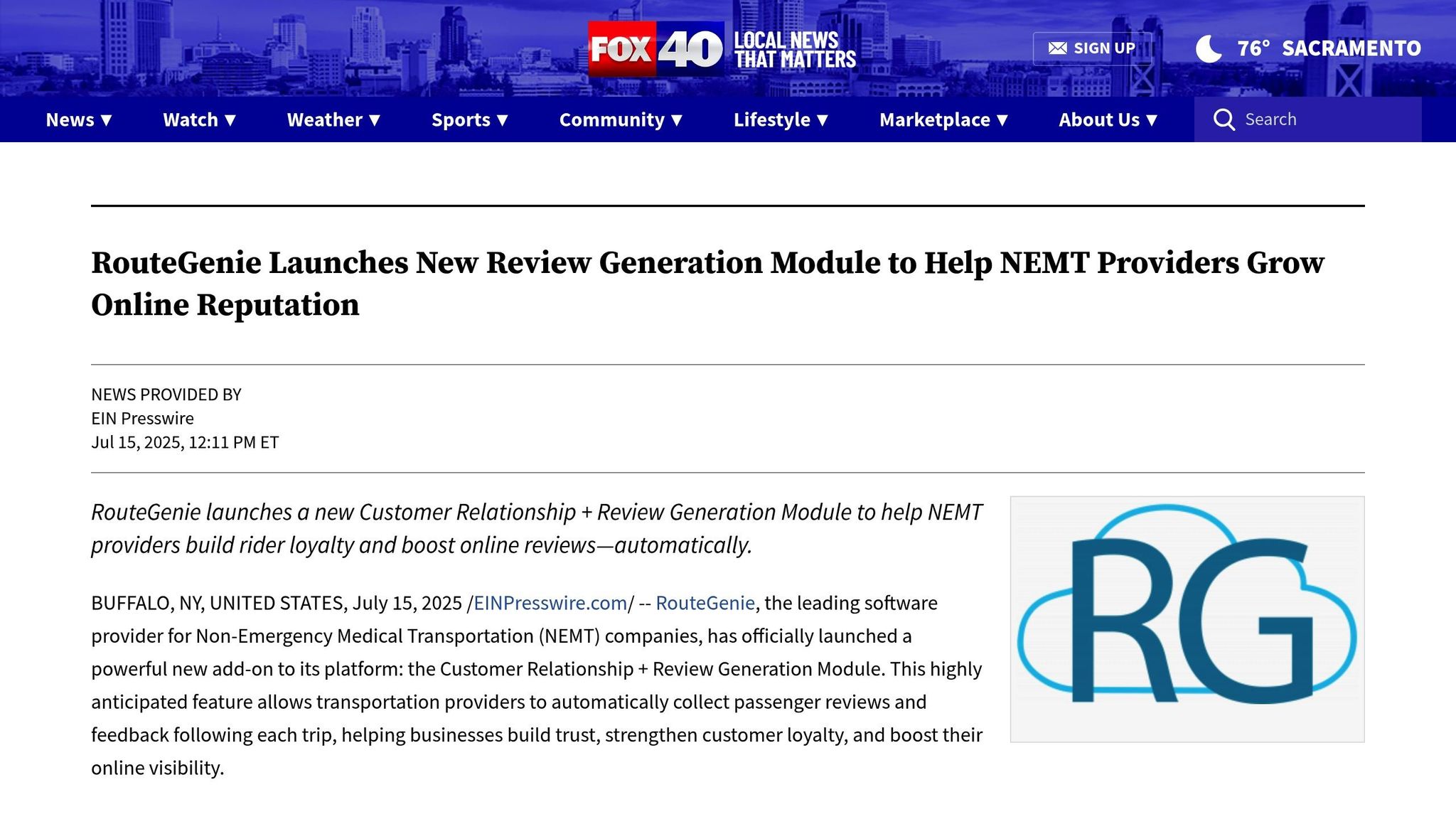
RouteGenie shines when it comes to Motor Vehicle Records (MVR) checks and license tracking, ensuring driver safety and compliance. Its MVR monitoring system sends timely reminders to prevent lapses in certifications. By securely managing verified records, RouteGenie minimizes fraud risks and enhances operational efficiency.
HireSafe
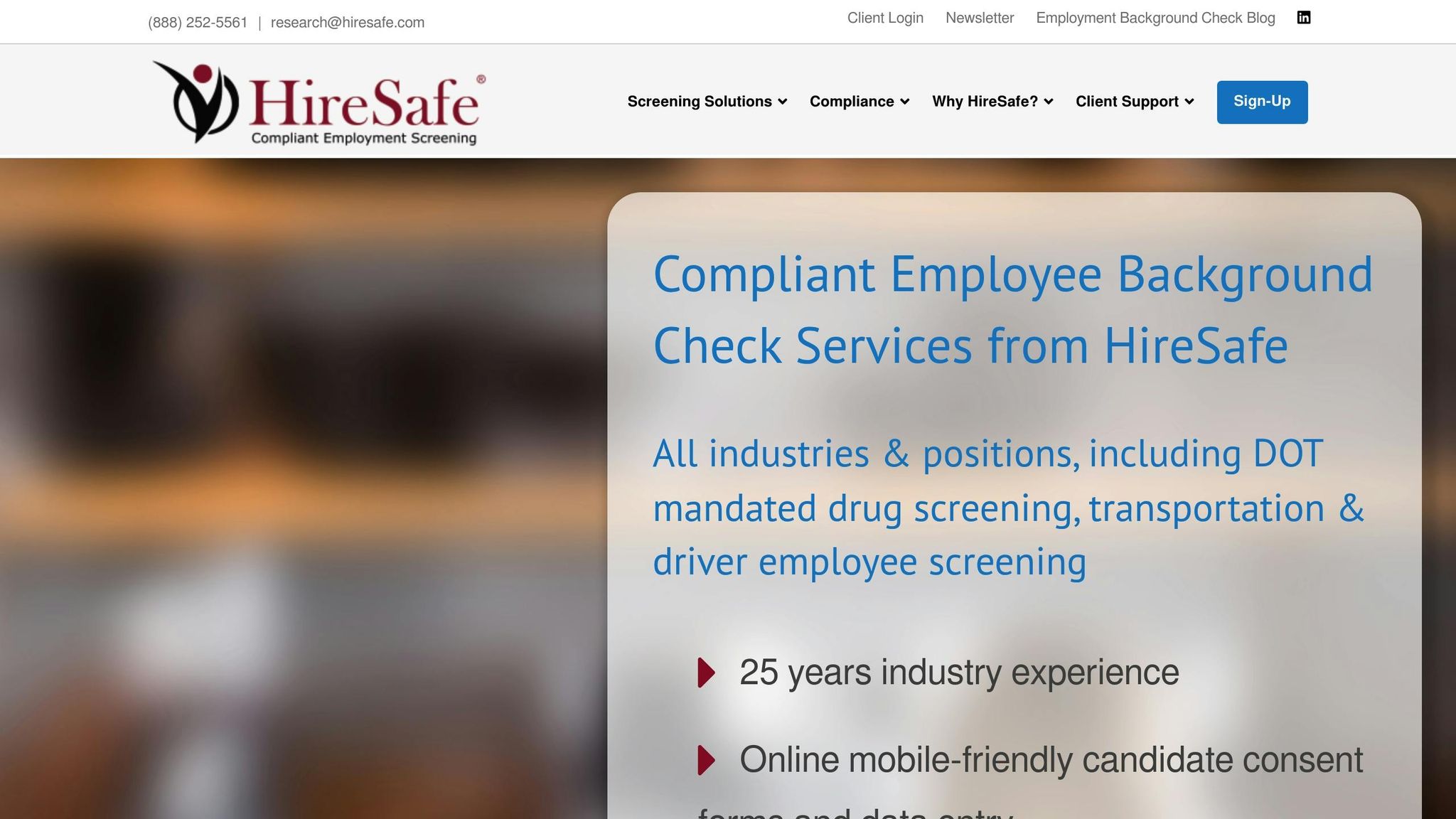
HireSafe provides an all-in-one solution for background checks, including searches of the Multi-State Criminal Record Database, the National Sex Offender Registry, and Motor Vehicle Records. This integrated approach allows NEMT providers to handle large volumes of screenings more efficiently, simplifying the entire process.
MediRoutes
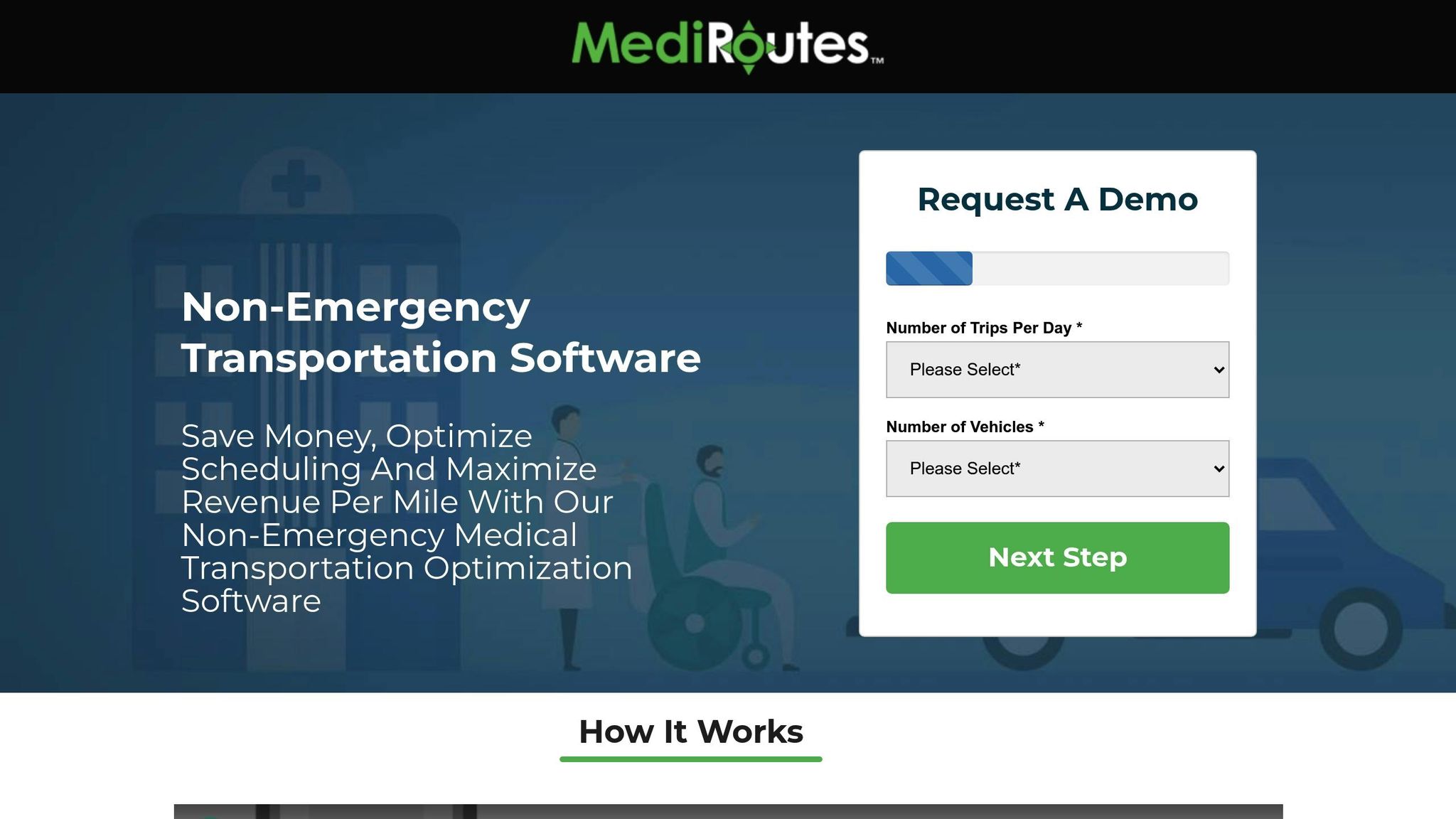
MediRoutes goes beyond basic background checks by integrating compliance management into daily operations. It tracks driver licenses, permits, and certifications while automating status updates across the system. The platform also facilitates random drug testing and securely records results, helping providers maintain compliance with regulatory requirements.
TripSpark

TripSpark specializes in compliance documentation and record retention. It keeps detailed audit trails and securely stores screening records, making it easy to demonstrate compliance during audits. Additionally, real-time status updates and automated alerts for rechecks allow managers to address issues promptly.
Tobi Cloud
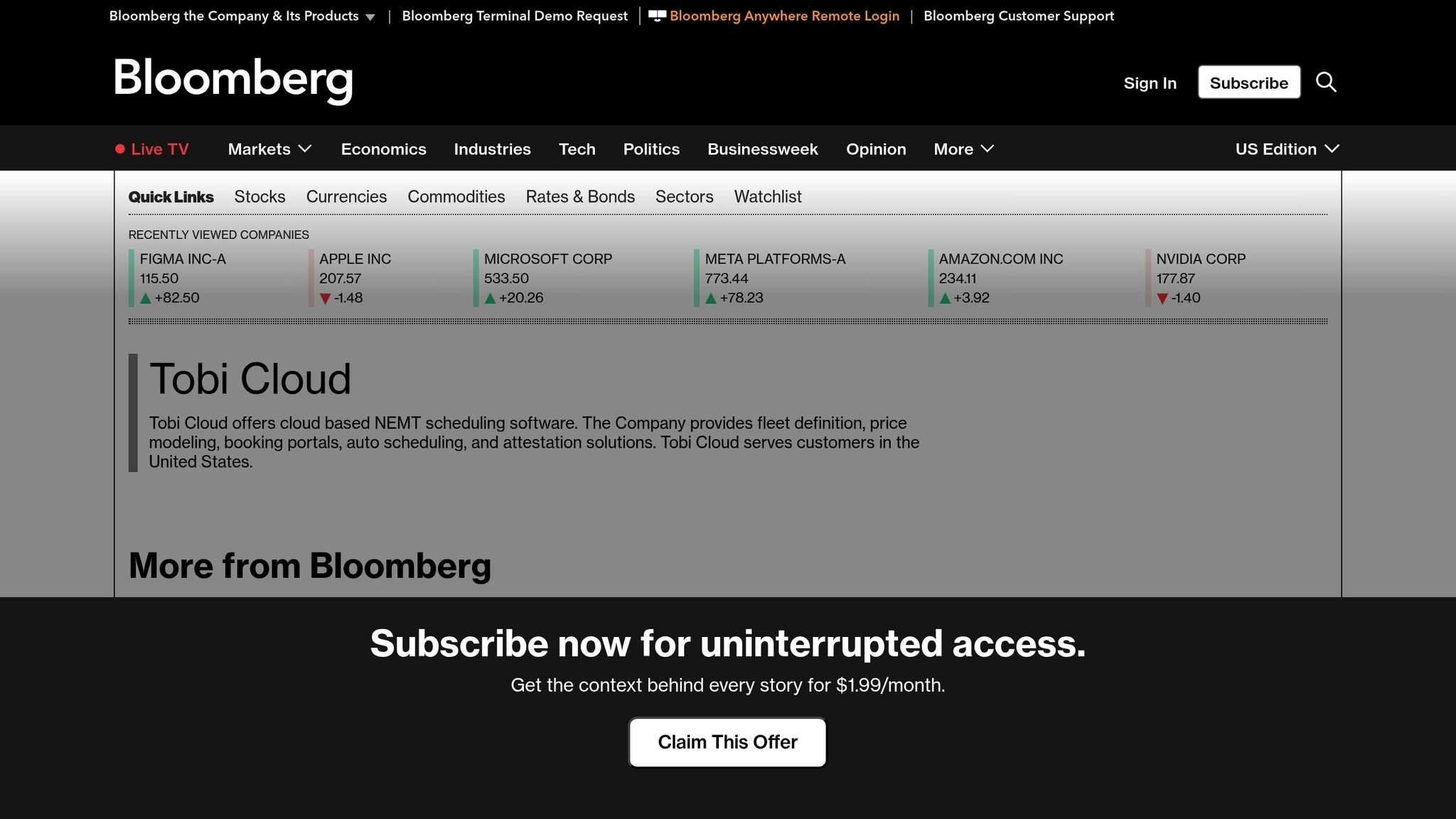
Tobi Cloud offers a full-featured NEMT software platform that combines scheduling, routing, driver management, billing, and dispatch. Features like electronic signatures, GPS tracking, and mobile access provide real-time visibility and seamless compliance documentation. Starting at $50 per user per month, Tobi Cloud delivers a complete management solution for NEMT operations.
RoutingBox
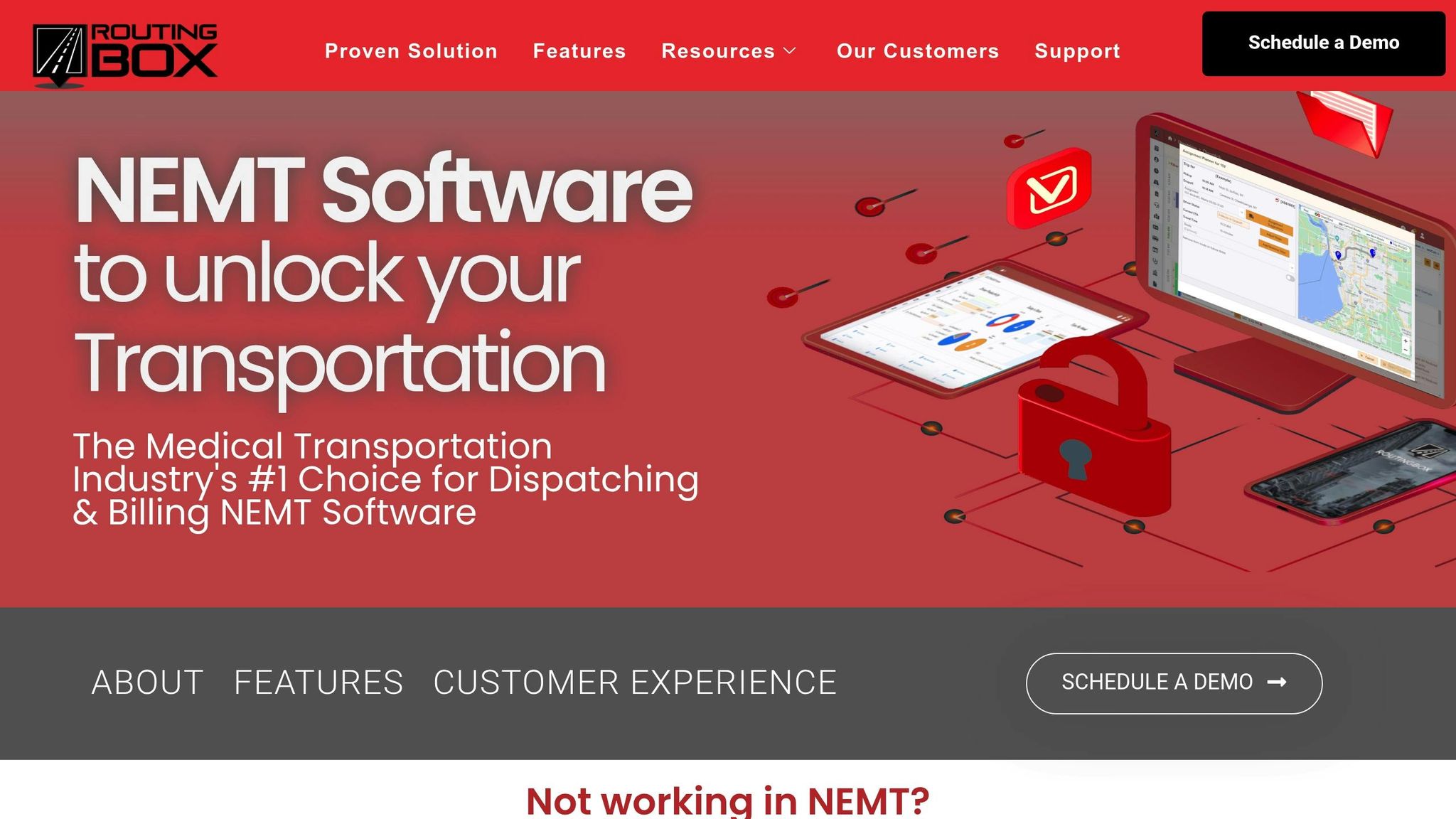
RoutingBox stands out with its robust API integrations, which sync screening data across scheduling, dispatch, and billing systems. This connectivity ensures driver compliance statuses are always up to date. Its proactive screening tools also flag potential compliance issues early, giving providers time to resolve them before they escalate.
sbb-itb-cef70f4
Comparison of Screening Tools
Comparison Metrics
When evaluating NEMT screening tools, focus on these essential metrics:
Screening components are the backbone of any reliable tool. These typically include criminal history checks, Motor Vehicle Records (MVR) reviews, drug testing, employment verification, and ongoing monitoring. Together, these elements ensure a thorough vetting process.
Compliance features are equally vital. A staggering 94% of FMCSA audits in 2024 uncovered at least one violation, highlighting the importance of tools that align with DOT and FCRA standards. Features like audit trails are essential for regulatory inspections.
Automation capabilities streamline operations, especially in an industry grappling with a 94% annual driver turnover rate in 2024. Automating tasks like license tracking, certification renewals, and rechecks reduces administrative burdens and keeps compliance on track.
Integration features determine how seamlessly a tool works with existing NEMT software. Tools with API connectivity, real-time data syncing, and workflow automation ensure accurate driver status updates across systems. Once integration is confirmed, the next step is evaluating the cost structure.
Pricing structures vary widely. Common models include per-vehicle, per-trip, tiered, and flat-rate options, allowing organizations to choose what best fits their operational scale and budget.
Comparison Table
The table below provides a side-by-side look at key metrics to help with decision-making:
| Tool | Key Strengths | Compliance Focus | Automation Level | Integration | Pricing Model |
|---|---|---|---|---|---|
| Occuscreen | Criminal screening, drug testing | FCRA compliant | Electronic workflows | Standard API | Custom packages |
| RouteGenie | MVR monitoring, license tracking | DOT compliance | Automated reminders | Document management | Per-vehicle basis |
| HireSafe | Multi-database searches | FCRA, NIJ guidelines | High-volume processing | Integrated platform | Tiered pricing |
| MediRoutes | Compliance management | DOT, FCRA | Full automation | Native integration | Flat-rate monthly |
| TripSpark | Documentation, audit trails | Record retention | Automated alerts | Real-time updates | Enterprise pricing |
| Tobi Cloud | Complete NEMT platform | Full compliance suite | End-to-end automation | Multi-system sync | $50/user/month |
| RoutingBox | API integrations | Proactive monitoring | Early warning system | Robust connectivity | Usage-based |
Occuscreen and HireSafe stand out for their robust screening capabilities, while MediRoutes and Tobi Cloud offer more comprehensive integration for operations. RouteGenie, TripSpark, and RoutingBox focus on specialized features, catering to specific needs. Smaller providers may find per-trip or tiered pricing appealing, while larger fleets often benefit from scalable models. Choosing the right tool not only ensures passenger safety and compliance with federal regulations but also enhances overall operational efficiency.
Conclusion
Choosing the right background screening tool is a game-changer for NEMT providers aiming to maintain compliance and build a thriving business. Across the industry, the use of specialized screening services has become a clear indicator that thorough vetting isn't just a best practice - it's a necessity for staying operational.
The financial and operational risks tied to inadequate screening are too significant to ignore. With packages starting at just $49 and delivering results in as little as 2–3 business days, the cost is a small price to pay compared to the potential fallout from compliance violations.
Automation and digital integration bring even more value to the table. Tools like Occuscreen, with over 15 years of experience in the NEMT space, and MediRoutes, offering full automation capabilities, show how technology can simplify compliance and lighten administrative workloads. These solutions not only ensure adherence to regulations but also pave the way for growth by making operations more efficient and secure.
For NEMT entrepreneurs with ambitions to scale, investing in reliable screening tools is a critical step toward establishing a reputation for safety and compliance. By leveraging the right technology, staying proactive with monitoring, and seeking expert guidance, providers can position themselves for long-term success in a competitive market.
At NEMT Entrepreneur, we’re committed to equipping transportation professionals with the insights, strategies, and tools they need to overcome challenges and expand their businesses with confidence. By prioritizing effective screening and adhering to best practices, NEMT providers can focus on what truly matters - delivering dependable, safe transportation services that make a meaningful impact in their communities.
FAQs
What compliance standards should NEMT background screening tools meet, and why are they important for my business?
NEMT Background Screening: Federal Standards You Need to Know
When it comes to Non-Emergency Medical Transportation (NEMT), background screening tools must meet critical federal standards. These include Motor Vehicle Record (MVR) checks, criminal background checks, drug testing, and health certifications. These requirements are designed to align with regulations such as FMCSA and Medicaid guidelines, prioritizing both safety and legal compliance.
Why does this matter for your business? Adhering to these standards not only ensures that your drivers are qualified and safe to operate but also protects your passengers and reduces liability. Beyond that, staying compliant helps you avoid costly penalties and boosts your reputation in the NEMT industry.
What’s the best way to choose the right pricing model for a background screening tool for my NEMT business?
When deciding on a pricing model for a background screening tool, it’s important to weigh factors like how often you’ll need to run checks, the specific screenings required, and your budget. Costs generally fall between $30 and $100 per check, so finding an option that aligns with your operational demands is key.
For businesses that conduct background checks frequently, a subscription-based model can offer more predictable costs and potential savings over time. However, if you only need screenings occasionally, a pay-per-check model might make more sense. The goal is to strike a balance between cost-effectiveness, compliance, and the unique requirements of your NEMT business - ensuring reliable screenings without overspending.
What features should a background screening tool have to work smoothly with my NEMT software?
When selecting a background screening tool to work with your NEMT software, prioritize one that includes API integration for effortless data exchange. Opt for tools that automate crucial checks like criminal records, driving history, and employment verification. This not only saves time but also ensures compliance with necessary regulations. Additionally, make sure the tool integrates smoothly with your dispatch, scheduling, and compliance systems to simplify operations and align with federal requirements.

